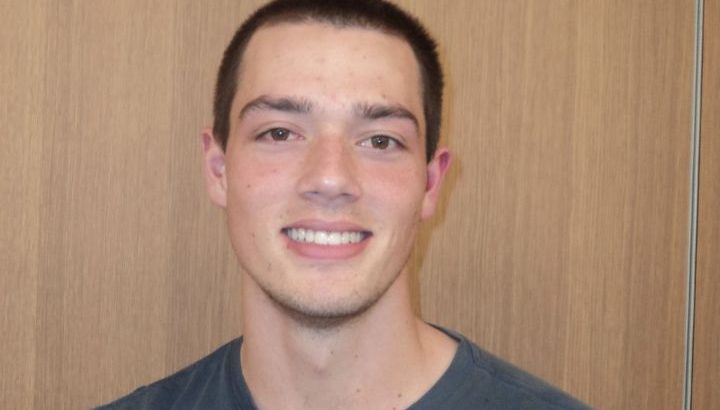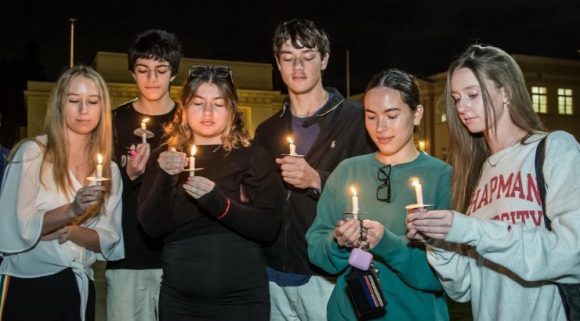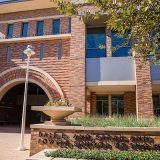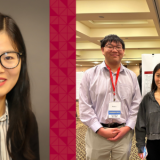
Exploring Clean Engineering: The Eco-Friendly Career of Chapman’s Computer Science Club Vice President, Tyler Lewis “I get the opportunity to put my effort into stuff that actually matters. And I love that Chapman gives me that opportunity.” Tyler Lewis ‘24
April 23, 2024
Name: Tyler Lewis
Major: B.S. Computer Science ‘24, M.S. Electrical Engineering and Computer Science (EECS) ‘25
Themed Inquiry: Business and Economics
Extracurricular Involvements: Chapman Computer Science Club Vice President, Computer Science Student Tutor, Research Assistant, Snow Club
Career Outlook: Engineering Associate at Clean Coalition, former Algorithm Software Engineering Intern at Continental, former Associate Engineer for Acelerex, former Software Developer for IEEE Blockchain Transactive Energy Initiative (BCTE)
For Tyler Lewis, renewable energy has always been a key part of his life. Hailing from Santa Barbara, a hotspot for sustainable initiatives, Lewis grew up surrounded by the renewable energy industry. Through his passions in the clean energy space, Lewis has undertaken multiple projects and commitments to further his career.
From his internship for Continental Automotive Group, an automotive technology manufacturing company that specializes in advanced driver-assistance systems (ADAS) to his first year in the M.S. in Electrical Engineering and Computer Science (EECS) program, Lewis has made an impact on the Chapman University Fowler School of Engineering community.
Upbringings in Renewable Energy
During his first few years at Chapman, Lewis was involved in his father’s nonprofit organization, Clean Coalition, helping his father expand and deliver renewable energy solutions. “The clean energy space is something I’m really sold on. I’ve been surrounded by clean energy and electric vehicles and all this stuff for basically as long as I can remember,” Lewis said.
Related to his path of working with renewable energy, Lewis also mentioned the increasing competition and demand for its parent industry. “The electricity industry is one of the biggest industries in the world. And in the United States, the energy demand is anticipated to continue growing at a tremendous rate every year,” he said.
Since coming to Chapman, Lewis sought out multiple opportunities to grow his network and strengthen his interests in the industry he grew accustomed to.
“When I came to Chapman, I wasn’t entirely sure what I wanted to do, except I knew I was good at computers. I liked computers. I wanted to go somewhere in that direction. And so, during my time at Chapman, I’ve explored renewable energy and applied my computer science skills towards that,” he said.
The Experience of Electrical Engineering
During his junior year at Chapman, Lewis worked on an independent project that aligned with his passions in renewable energy. Through the Institute of Electrical and Electronics Engineers (IEEE), Lewis curated a case study under the Blockchain Transactive Energy Initiative, serving as its sole Software Developer.
“They gave me an opportunity to submit a case study on a theoretical idea of how blockchain could be utilized in energy systems, particularly with the transactive nature. I had a partner on this project from a company called Electriq Power. I was really given the creative freedom to kind of envision this project and execute it how I wanted,” Lewis said.
After completing the project, Lewis continued working for Clean Coalition, where he happened to be working on a residential project for a former Continental executive. “I was putting in solar, battery, and microgrid systems on a home. I got to talking with the guy who owned the home. Continental was doing interviews for a summer internship, and he basically told me to come in and interview,” he said.
After securing his position at Continental, Lewis was introduced to a variety of new projects happening at the company’s site. “The project there was to develop a LiDAR camera capable of being implemented in autonomous vehicles. The people I was working with were all dedicated to developing LiDAR cameras for autonomous purposes,” Lewis said.
For most of his time at Continental, Lewis performed testing and validation tasks, as well as some projects surrounding LiDAR camera sensors. “One of my main projects was building a setup to test how the thermal changes in the sensor’s environment will affect its accuracy. Just kind of fine-tuning the device at various temperatures. They also had me working on software tests, which were unit tests for various parts of the operating system for this camera,” he said.
Lewis reflected on his positive experience with Continental, mentioning not only how the environment was welcoming and collaborative but also offered a glimpse into his future outside of academics.
Merging Class Knowledge with Career Development

Tyler Lewis, Computer Science ’24, appreciates the community he’s found at Chapman amongst his peers and faculty.
When thinking about the contributions of his academic career, Lewis noted the beneficial nature of Fowler Engineering’s classroom experience. “I get the opportunity to put my effort into stuff that actually matters and it’s ultimately why I’m here. I’m here to learn. And that’s what I’m doing. And I love that Chapman gives me that opportunity,” he said.
Lewis also mentioned the benefit of Chapman’s tight-knit community when it comes to academic success. “What Chapman and Fowler really behooves me in the educational stance, is the small class sizes, getting to know my professor, and even if it’s unintentionally, your professor’s going to get to know you, just given the dynamic that exists here at Chapman. And that’s what I really like in contrast to my friends at other universities,” Lewis said.
During his gap semester working for Continental, the lessons and skills from his classes had followed him into his internship. Specifically, Thomas Springer’s CPSC 380: Operating Systems class.
“One thing I really liked was that he brought his industry knowledge to the class. He was comparing what we were learning to real-world things he had done in the aerospace industry, which is really cool to just kind of be exposed to someone who can show the utilization of what you’re doing,” Lewis said.
Now, Lewis is aiming to use those experiences from the workplace to better prepare for his upcoming year of MS in EECS coursework. “I’m planning on utilizing the project [with IEEE] as the basis for my thesis, which is determining the feasibility of using these systems in contrast to traditional systems that we rely on,” he said.
Based on Lewis’ career experience and industry knowledge in clean energy, he is using his upcoming thesis as a way to create solutions to current challenges. “There’s various problems with how our electrical grid works. And I would love to be part of a revolution in that space,” he said.
Reflections for Students
One lesson that Lewis recommends is to continue being organized. “Something that I wish I had done from the get-go was keeping a really fluid set of notes between all my classes and actually extending those notes to aspects of my normal day-to-day life,” he said.
Lewis stressed the importance of being organized due to some of the potential problems that may arise from not having a system. “One, it’s easy to lose the details. And two, it’s easy to have a bunch of notes scattered all around. If I were to go back to the beginning, I would figure out some plan of how I’m going to keep track of what’s going on in my classes,” he said.
Through his involvement in the Computer Science club, Lewis met other students within and outside the disciplines of engineering. Lewis credits meeting these other students, such as Owen Agbayani, as a motivating factor in pursuing more for his academic journey.
“Owen’s been my role model because despite his non-education in computer science, he’s continued to stay motivated and happy. He participates in the Computer Science Club and he is such a warm light in our lives,” he said.
Lewis encourages students to meet people and pursue involvement in student clubs and organizations on campus whether within your major or aligned with your interests.
Now, as he finishes up the last few months of his undergraduate degree, Lewis looks forward to the challenges that await him beyond his academic career.
“I still have plenty of hurdles to overcome in finding opportunities. When I leave school in a year, that’s going to be a major thing that I have to overcome. To try and find a job and find what is most important to me. To find something interesting, something that captivates me,” he said.
Visit Fowler’s Careers and Internships website to access resources for finding your next internship, or to schedule your next Career Advising appointment with Fowler’s Manager of Career Services, Sam Lee. For more information on how to get involved on campus, explore Chapman’s website regarding Clubs and Organizations

